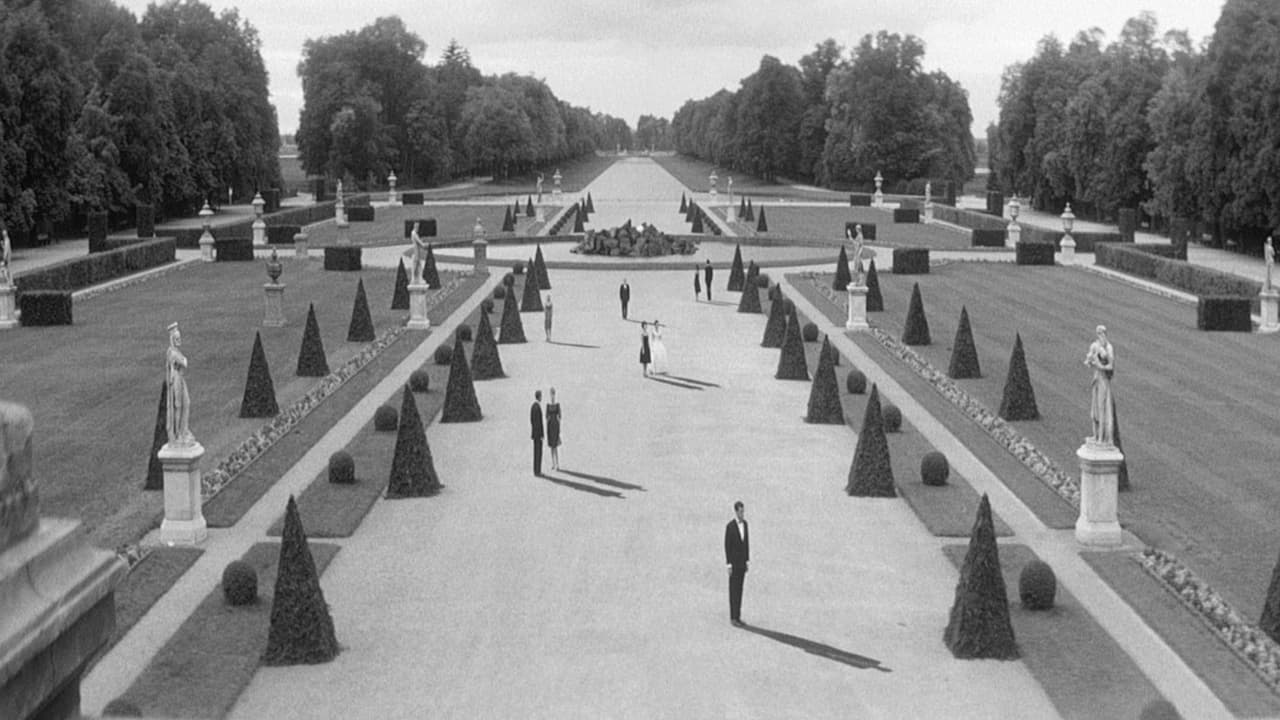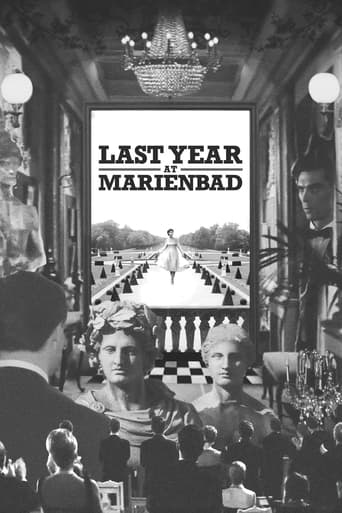

"Last Year at Marienbad" is the most enigmatic film that I have ever seen. I don't know if there is a "correct" interpretation of this film. The editing of the film make any sense of time irrelevant. Some scenes repeat, cut in without context, others replay with entirely different scenarios. The long, slow tracking shots, the muted dialogue with other people besides the main three, the way the people around them will suddenly stop moving to show the importance of the situation to the characters, and the soundtrack done mostly with organ and piano, truly create a unique and gloomy atmosphere.I am convinced the whole film takes place entirely in the characters' memories, but I can't really figure out which one, or if it's just all of them. It is unclear whether the lady, who is unnamed along with the rest of the characters, is alive or dead. The set design seems to loop in a never ending labyrinth, like the memories of the characters. I'm pretty sure that the story is told from the main three characters' perspectives, and they are each remembering what they've lost with each other, while the woman still can't decide if she made the right decision regarding whether to leave the man she is with for another, no matter what decision she did end up making (which I still can't quite decipher). This is simply my interpretation, but this interpretation (and all others) are truly irrelevant. I feel the main purpose of this film is not to simply tell a story, but evoke the emotions that these characters feel. It's a tough film to get into, but once you're into it it proves to be incredibly immersive. Eventually, we begin to feel what these characters do. We feel the loss, regret, and how close they were to love. But now this fading memory just feels like a dream, or a nightmare.
... View MoreDid they meet? This question will pop on the viewers mind a hundred times while the movie runs.Analizing François Resnais career, we can see his passion for love, represented on the screen. He develops high quality films, made from scratch. In this movie, Resnais uses many resources to deliver a confusing but very entertaining movie.He uses two timelines, but with the originality, that one of them maybe is fake. Perhaps they met, perhaps they didn't. Excellent takes (remarking the use of exteriors), with shots of ambiguous conversations, conform a very well thought movie that will keep the viewer with its full attention on it through its 90 minute length.The script, which is more intelligent than the one shown on "Hiroshima mon Amour", but with a similar topic: Two individuals from different places that randomly met and start learning about each other (this was taken 40 years later by Linklater for his love trilogy).This is a movie made not only to enjoy itself, but to enjoy the whole cinematographic concept.
... View MoreI was first introduced to this film in college.The first viewing stunned me. I was literally hypnotized by the imagery and the aura.Years passed, and I saw it again on DVD. It was as if I was inside the film again, repeating my life at Marienbad. A couple of weeks ago, I was deeply saddened to hear the news of the passing of the great French director Alain Resnais. Among the numerous pieces I have of his, I picked this out and saw it again. It was magical, as it always was. Too bad they don't make movies like this anymore. But still Long live cinema!
... View MoreThis French language film was one featured in the book of 1001 Movies You Must See Before You Die, from director Alain Resnais (Night and Fog), but like most of the other titles I had no clue about what it would entail, so I was hoping at five stars out of five it would be worthy of the honour. Basically at a château or baroque hotel a social gathering is taking place, a man, referred to as 'X' (Giorgio Albertazzi) approaches a woman, referred to as 'A' (Delphine Seyrig). He claims that had met before previously a year ago at Marienbad, he is also convinced that she has come to the event intentionally as she was waiting for him, but she says that have never met before. Her husband, referred to as 'M' (Sacha Pitoëff), tries to stop the man from bothering his wife, and challenges him in a mathematical game and beats him several times, but he seems to be correct as the film delves into flashback sequences as he describes past meetings. That is all I can say really, I think maybe because the characters had no names, and the story going backwards and forwards in time it was perhaps a little confusing. But the camera winding through various corridors, the use of voice overs and the scenes between the two lead characters are interesting enough, from what I can remember it was a watchable drama. It was nominated the Oscar for Best Writing, Story and Screenplay - Written Directly for the Screen, and it was nominated the BAFTA for Best Film from any Source. Good!
... View More